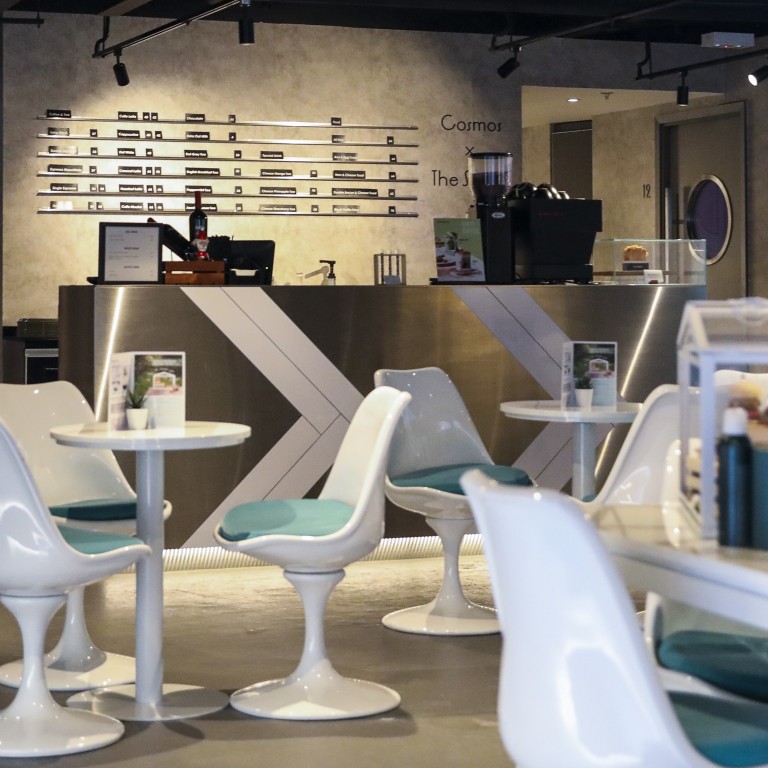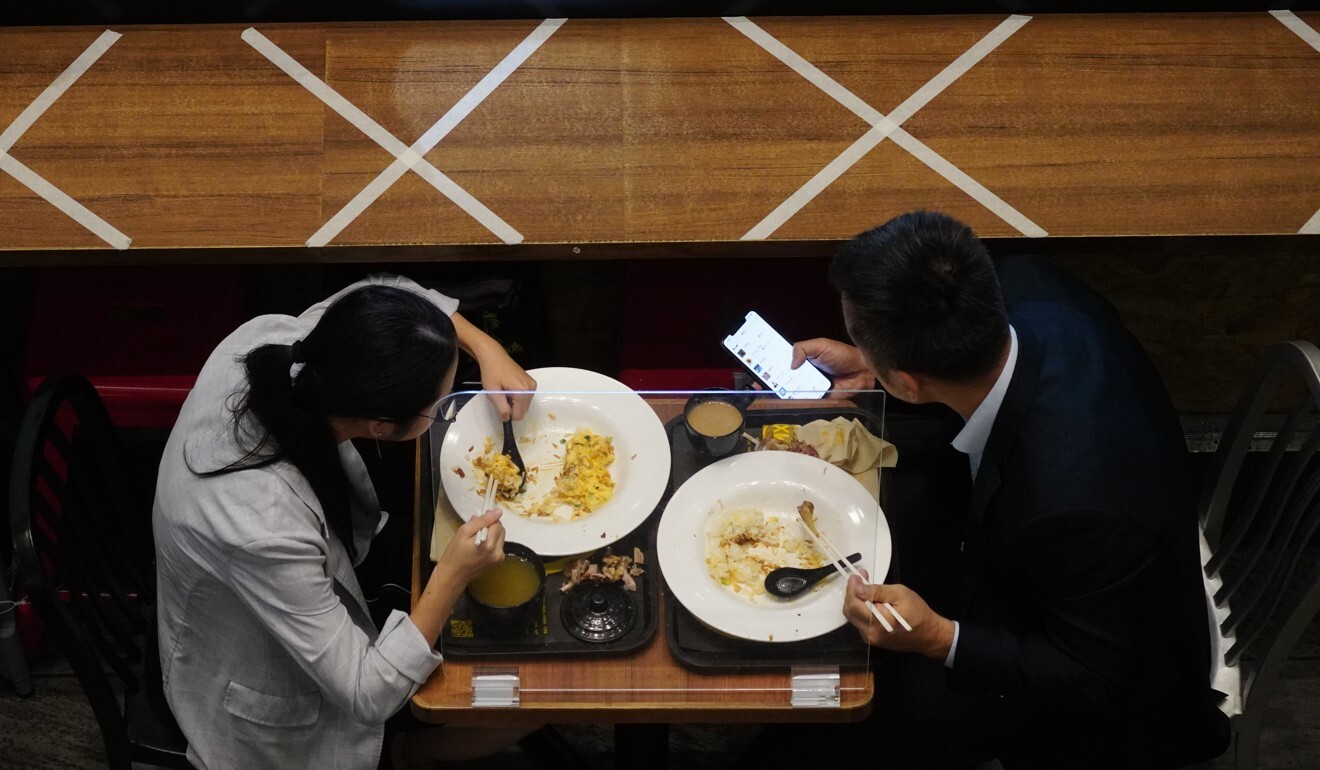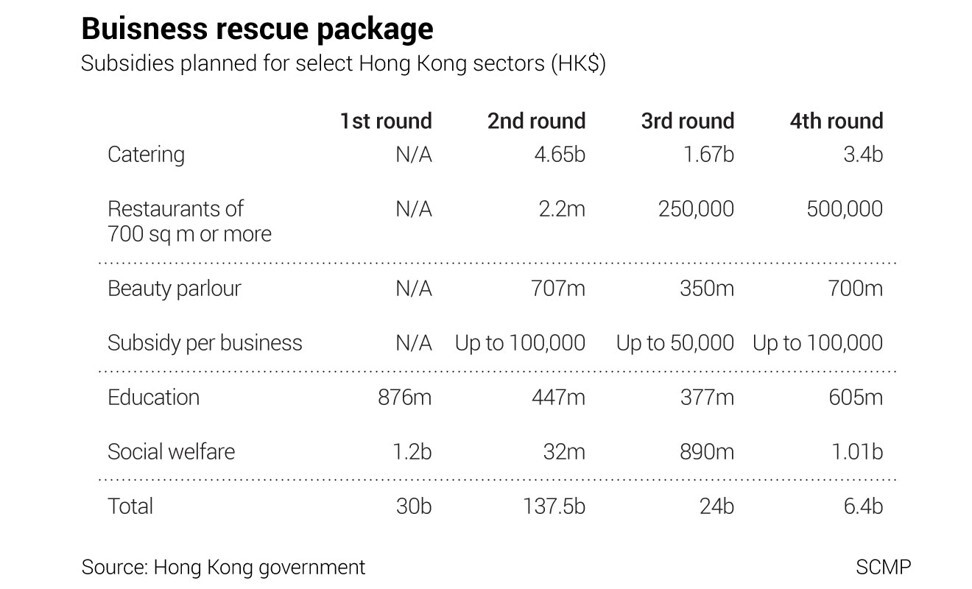
Hong Kong fourth wave: new round of coronavirus relief funding not enough, but ‘better than nothing’, business owners say
- Many operators say new subsidies, while larger than previous rounds of relief, not enough to cover expenses
- One-off payments will not come close to matching what businesses ordinarily earn in peak holiday season, they claim
The government touted the fresh relief as specifically targeting businesses and people suffering the most under the city’s social-distancing rules, saying the funds earmarked for the hardest-hit industries were double of that granted in the previous round of aid in September.
However, Wing Shun Kum-ying, 45, who runs the salon Wing Nail in Causeway Bay, said she was disappointed at the HK$30,000 (US$3,870) subsidy she was entitled to.

Her 700 sq ft shop, with a rent of HK$13,000 a month, was forced to shut two weeks ago when the government announced stricter rules for businesses and public gatherings through December 23.
But businesses such as hers, she said, “should be exempted, because many nail shops are tiny and won’t have a bunch of customers at one time”.
“The existing outbreak is so severe that I bet the closure will be extended, which means zero income for the entire month,” she added. “Even if it is reopened next month, customers are unlikely to come back because they can’t wait to trim or undo their nail polish, and will do it by themselves.”
With less than two days’ notice, beauty shops, massage parlours, gyms, bars and pubs, and entertainment facilities such as party rooms, cinemas, and karaoke establishments were ordered to close temporarily from December 3, while restaurants were banned from providing dine-in services after 6pm.
Schools were also shut, and most civil servants and workers in the private sector were asked to work from home.

Shun said if the government really wanted to help businesses, it would put in place arrangements, such as closing loopholes for travellers arriving in the city, that would help bring the fourth wave under control.
Cyber Yin, who co-owns the party room brand Party Fun, said the one-off subsidy of HK$40,000 per venue – double the amount he received under the third round of relief funding – would help him cover part of the rent for his 11 locations.
“It’s better than the last round. We only got HK$20,000 per location last time, and it couldn’t even cover the rent,” Yin said.
Hong Kong fourth wave: HK$6.4 billion in fresh round of relief for businesses
But Christmas was usually a peak season, he added, with each location typically bringing in between HK$60,000 and HK$80,000 in December.
“Our firm has to rely on the income driven in peak seasons to make up for the quieter business times,” he said. “When we can’t operate in peak seasons, it’s miserable.”
He noted that his company had cancelled 10 bookings for the Christmas season, adding that he hoped the government would allow it to reopen soon.
Eva Yu, who runs two bathhouses in the city, described the HK$100,000 one-off subsidy she would receive for each location as better than nothing.
But Yu said even though the allowance was twice what she got previously, each of her establishments had operating costs of some HK$900,000 a month, including the wages for more than 200 workers.

Yu said she hoped officials would give bathhouses subsidies in accordance with their size, just like Chinese restaurants, which were entitled to HK$500,000 if they occupied a space larger than 7,535 sq ft.
“Chinese restaurants and us are paying similar amounts of rent and hiring a similar number of workers,” she said.
Tricia Yap, who helped set up the Hong Kong Alliance of Boutique Fitness Operators, said her sector would have preferred a one-off subsidy of HK$150,000 for each gym location, instead of the HK$100,000 allotted under the new fund.
“We are now entering the busiest period for fitness, because people are now thinking about their New Year’s resolution,” Yap said.
She said because of red tape, many business owners still had not received the subsidies from the third round of relief funding, which allocated HK$50,000 per location. Yap said she had to put her own savings into the business to stay afloat.
“How much more can we keep doing this?” she asked.
Nicholas Wang, executive director at Neway Karaoke Box Hong Kong, said he needed more than the HK$50,000 per location that he was entitled to in the new round.
He said his chain had more than 10 karaoke lounges, with rent for each costing between HK$400,000 and HK$500,000 a month.
Former legislator Jeremy Tam Man-ho, who runs a cha chaan teng restaurant called Three Meals in Mong Kok with fellow Civic Party member Gordon Lam Shui-wa, said his HK$100,000 one-off subsidy under the new fund was only enough to pay the rent for his 700 sq ft outlet.
After hiring about 12 staff, he said, his restaurant’s operational costs were about HK$400,000 a month, and the recent ban on dine-in services after 6pm had dealt a heavy blow.

“I think the one-off subsidy is only a drop in the bucket for most of the eateries in Hong Kong,” he said.
Tam estimated that his restaurant lost at least 40 per cent of business due to the dine-in ban, saying the catering industry had unfairly borne the brunt of recent outbreaks of Covid-19, which were not caused by restaurants.
“The city’s restaurants are indeed the victims of the government’s anti-epidemic policies. The government just wants to restrict our business operations to discourage people from going out. In the end, all the restaurants are suffering,” he said.
However, the Chinese Manufacturers’ Association, one of the city’s biggest business chambers, said it welcomed the latest round of financial subsidies and urged the government to step up the approval process, maintaining the measures would help struggling industries.




